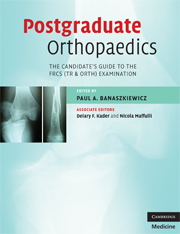Book contents
- Frontmatter
- Contents
- List of contributors
- Foreword by Mr Peter Gibson
- Preface
- Glossary
- Section 1 The FRCS (Tr & Orth) examination
- Section 2 The written paper
- Section 3 The clininicals
- Section 4 Adult elective orthopaedics oral
- Section 5 The hand oral
- Section 6 The paediatric oral
- Section 7 The trauma oral
- Section 8 The basic science oral
- Section 9 Miscellaneous topics
- Index
Preface
Published online by Cambridge University Press: 22 August 2009
- Frontmatter
- Contents
- List of contributors
- Foreword by Mr Peter Gibson
- Preface
- Glossary
- Section 1 The FRCS (Tr & Orth) examination
- Section 2 The written paper
- Section 3 The clininicals
- Section 4 Adult elective orthopaedics oral
- Section 5 The hand oral
- Section 6 The paediatric oral
- Section 7 The trauma oral
- Section 8 The basic science oral
- Section 9 Miscellaneous topics
- Index
Summary
This book has been written specifically for candidates preparing for the Intercollegiate Board Examination in Trauma and Orthopaedic Surgery. It is an attempt to guide the orthopaedic trainee better in his or her preparation before they are thrown into the lion's den. It is not intended to replace or be a substitute for the numerous orthopaedic textbooks available. I make no claim for the originality of the material contained within this text. The core material originated from notes made whilst preparing for the FRCS Orth examination from a wide variety of differing sources. We are not trying to re-invent the wheel!
The curriculum for this examination is vast and therefore we have asked a variety of colleagues to contribute to various sections. Our aim was to put forth differing views and opinions regarding the key essentials for success in this examination and to give as broad a prospective as possible to candidates preparing to sit the examination. There is no doubt that the FRCS Orth is a stressful experience even for the most well prepared candidate. There is nothing more frustrating than a good candidate with good knowledge failing the examination because of lack of orientation and technique in the examination.
We have broken the book down into various sections to make revision easier. The first section covers the written paper. We give general advice about preparation.
- Type
- Chapter
- Information
- Postgraduate OrthopaedicsThe Candidate's Guide to the FRCS (TR & Orth) Examination, pp. xi - xiiPublisher: Cambridge University PressPrint publication year: 2008



